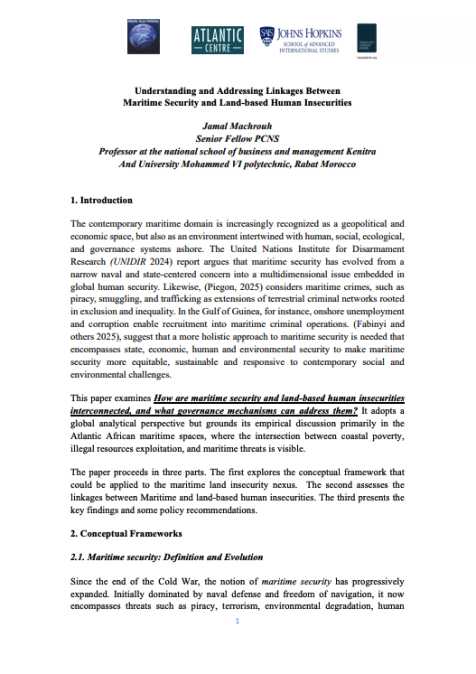Publications /
Opinion
The illusion ended in an agricultural hamlet, a forgotten place in Eastern Syria named Baghuz Al-Fawqan. A fantasy, the resurrection of Islamic greatness and rules of a caliphate, known thirteen hundred years ago, reduced to a junkyard, a sober, disturbing, memorial of betrayal and misapprehension. Publicly the self-appointed caliph of the Islamic State, Abu Bakr al Baghadi, did not order his fighters to resist to the end, accept the fate of martyrs, promised to ascent to paradise. 1300 IS fanatics fought to death, sacrificing themselves in and around Baghuz, 1.5 square miles of savagery, a minor Stalingrad near the desert. During the final hours of the assault, the sky was brightly lit, and napalm, bombs, rockets hit the area with such ferocious precision and devastation that CNN war reporter Ben Wedeman concluded,” it is hard to imagine anyone is still alive”.
Hundreds of fighters, who were drawn to IS by perceived religious obligation, or deluding themselves about the grandeur and utopia of the Islamic State, pulled themselves out of the mud, braving machine gun fire, ready to surrender. This was the end—for now. The caliphate declared bankruptcy, IS is going global. More than 40 000 foreigners of 80 nations are thought to have travelled to territory controlled by the IS, calculated “The Atlantic” writer Graeme Wood, author of “The way of the strangers: Encounters with the Islamic State”, and most are missing.” At least 1000 foreign fighters have been captured and are imprisoned, guarded by the Kurd controlled “Syrian Democratic Forces”. Wood is certain: “IS is not defeated, it is like a chronic disease.”
How right he was— on Easter Sunday ISIS demonstrated in Sri Lanka, this impossible lovely and serene island, suspended from the Indian subcontinent, “that its ideology continues to echo globally,” reported the “New York Times”. ISIS related local terror groups, attacked Christian churches and luxury hotels, killing natives and tourists alike, 250 in all. The newspaper concluded: ”The attacks show that even with no permanent territory on which to fly its black flag anymore, the Islamic State is still capable of orchestrating wide spread carnage through loyalists in far flung countries, including those like Sri Lanka, that few outside counterterrorism experts believed were in imminent danger”
“Time for others to step up”
Worldwide, thousands of ISIS fighters, veterans of a cruel war, may have returned home, undetected by authorities. Returnees from jihad will not necessarily fight again, but their passion can affect others. Facing incorrigible, unrepentant fanatics, it seems not surprising that allied governments are reluctant to follow Donald Trump’s tweets of February 17, 4.37 am: THE UNITED STATES IS ASKING BRITAIN, FRANCE, GERMANY AND OTHER EUROPEAN ALLIES TO TAKE BACK OVER 800 ISIS FIGHTERS THAT WE CAPTURED IN SYRIA AND PUT THEM ON TRIAL . THE CALIPHATE IS READY TO FALL. THE ALTERNATIVE IS NOT A GOOD ONE IN THAT WE WILL BE FORCED TO RELEASE THEM…” To be certain the urgency of the Presidential message would be understood. Mr. Trump added in a second tweet:…THE US DOES NOT WANT TO WATCH AS THESE ISIS FIGHTERS PERMEATE EUROPE, WHICH IS WHERE THEY ARE EXPECTED TO GO . WE DO SO MUCH AND SPEND SO MUCH—TIME FOR OTHERS TO STEP UP AND DO THE JOB THAT THEY ARE SO CAPABLE OF DOING. WE ARE PULLING BACK AFTER 100 % CALIPHATE VICTORY.”
“Easier said than done”
The prospect of repatriating citizens who had joined IS and of trying to prosecute or reintegrate them into society “has raised daunting concerns for many allied governments over security, legal and political risks,” elucidated the “New York Times”. When Trump twittered that the apprehended jihadists should be tried in court in their home countries, Heiko Maas, the German Minister of Foreign Affairs, declared on national TV,” that’s easier said than done”. About 1050 people are known by German security authorities to have left for Syria and Iraq since 2013. One third have returned to Germany. Since the American special forces are eventually pulling out of the Syrian combat zone, deserting their loyal Kurdish/ Arab allies ,it is uncertain for how long the Kurds, operating a de facto statelet, a small breakaway state , will be able to contain an estimated 80 000 IS activists ,families and fighters, in their rather primitive prisons , of which the internment camp Al-Hol alone holds ISIS related 72 000 people ,90 percent of them children and women. Abdulkarim Omar, who jointly heads the foreign affairs department of the Kurdish led self-styled administration in northeastern Syria stated: ”Some of them are very dangerous people, and we live in a very unstable area.” Unknown numbers have escaped, others are facing judges in their home countries.
“The terrorists group’s faceless evangelist”
”His voice is the most recognizable English speaking voice to have ever appeared in Islamic State propaganda, said Charles Winter, a senior research fellow at London’s International Center for the Study of Radicalization and Political Violence, at Kings College. More than four years ago the FBI appealed to the public to help identify the narrator in one of the Islamic State’ s horrifying videos released in September 2014, the “Flames of war”, showing Syrian soldiers digging their own graves and then being shot in the head. Speaking fluent English with a North American accent, “the man would go on to narrate other videos and radio broadcasts by the Islamic State, ”the “New York Times” recalled,” serving as the terrorists group ‘s faceless evangelist to Americans and other English speakers, seeking to learn about its toxic ideology”. Now the voice has a name—Mohammed Khalifa, a Canadian citizen, aged 35, born in Saudi Arabia‘s Jeddah of Ethiopian parents, immigrating to Toronto ,where he learned to speak like a Canadian, studied computer system technology and was drawn to the battlefield by watching YouTube.
Any regrets about his activities, the glamorization of violence and terror?” No, I don’t regret it”, Mr Khalifa said from a prison in northeastern Syria.” As the Islamic State was shrinking, Mr Khalifa abandoned his propaganda work and armed himself with a Kalashnikov, joining his last battle. The prisoner, who is married and has two children, does not know whether his family is dead or alive, neither is his immediate future clear. The Canadian government is reluctant to let Islamists return. Possibly Canada will hand the prisoner over to American authorities --who could call him as a witness in court cases of suspected IS executioners, like Alexanda Kotey.
“There are strong reasons for not requiring a death penalty assurance”
Kotey was born December 1983 in Britain to a Ghanian father and Greek Cypriot mother, and in January 2017 was designated by the US State Department as a terrorist. The US claims that Kotey was involved with beheadings and known for administering “exceptionally cruel torture methods”. The accused, captured on january 24th, 2018, trying to flee the crusade, is suspected to be a member of a notorious IS group, dubbed by the media as the “ Jihadi Beatles”—English speaking, scrubby, brutal and usually masked when they appeared in propaganda videos narrated by Mohammed Khalifa. One of their particularly brutal comrades, the British born Arab Jassim Abdulkarim Olayanal Dhafiri, also known as Jihad John, was killed in November 2015, aged 27, in a drone strike. Kotey, who has denied being an executioner or torturer, and his friend El Shafee Elsheikh, a British citizen as well, are expected to be transfered to the United States. London has stripped them of their citizenship and agreed to an extradition, although London usually does not deliver suspects if they might be subject to the death penalty. In July 2018, though it was reported that British Home Secretary Sajid Javid had written to the US attorney general about the case, saying “I am of the view that there are strong reasons for not requiring a death penalty assurance for this specific case, so no such assurances will be sought.”
Female IS activists like Hoda Muthana, 24, are kept in overcrowded internment centers as Al Hawi or Al Hol in north eastern Syria. The American, a former college student in the US State of Alabama, was 20 when she joined Islamic State. Today, after having married three fighters, one after the other, (her first two husbands were killed in action), Hoda is a prisoner: “Once I look back on it, I can’t stress enough how much of a crazy idea it was. I can’t believe it. I ruined my life I ruined my future,” the American confided in writer Rukmini Callimachi. Mrs. Muthana, the daughter of Yemenite immigrants, told the reporter how she was smuggled across the Syrian border in November 2014 and taken to a female dormitory, which was packed with hundreds of single women from around the world. Every day an ISIS official roamed the dormitory carrying a list of men looking for a bride. Hoda agreed to meet Suhan Rahman, an Australian, originally from Melbourne.
“Rent a big truck and drive all over them”
When her husband was ordered to fight, the devotee of terror posted toxic messages under her pseudonym: ”Hats off to the mujs in Paris”, she said in one of them, using an abbreviation for “mujahedeen” on the day in 2015 when jihadists stormed the offices of “Charlie Hebdo” and killed 12 people at the satirical magazine. The fanatic woman also urged others to join the terror organization. And Hoda used her account to help incite attacks in the West, including in the United States. ”Americans wake up!” the zealous militant wrote on March 15th, 2015. ”You have much to do while you live under your greatest enemy, enough of your sleeping! Go on drive by’s and spill all of their blood, or rent a big truck and drive all over thème”. As the end came near, the American woman followed the shrinking shadow of ISIS along the Euphrates River Valley. On the tenth day of the New Year, the American jihadist surrendered to US troops in the desert. They fingerprinted her-- the delusion, the caliphate, reduced Hoda’s future to a fathomless Fata Morgana. She is kept behind barbed wire with an estimated 10 000 foreign women, and many of them have not surrendered. Um Aisha, a 22 year old Chechen, described her life in the fallen caliphate as “all very good.” Her husband was killed in an air strike on the Islamic State’ s final battle in march, but the jihadist is convinced that the war of terror is far from over:” Our brothers are everywhere--- in Germany, in Russia ,in the US. We believe that al -Dawla al- Islamia will return.” Yes. ISIS has lost its caliphate, but not its capacity to sow terror.








